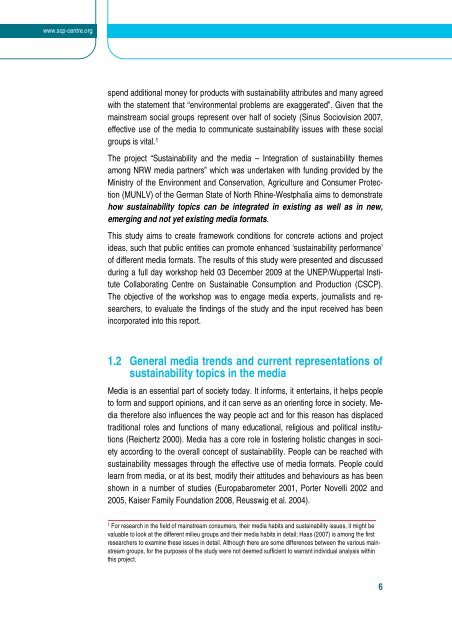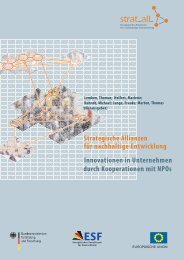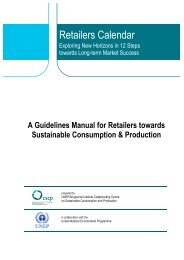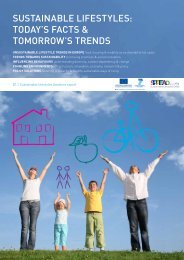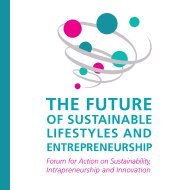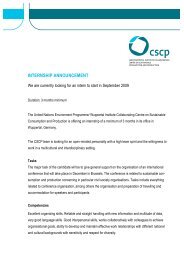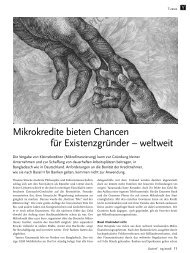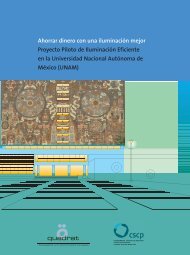integrating sustainability themes into media - Collaborating Centre ...
integrating sustainability themes into media - Collaborating Centre ...
integrating sustainability themes into media - Collaborating Centre ...
Create successful ePaper yourself
Turn your PDF publications into a flip-book with our unique Google optimized e-Paper software.
www.scp-centre.org<br />
spend additional money for products with <strong>sustainability</strong> attributes and many agreed<br />
with the statement that “environmental problems are exaggerated”. Given that the<br />
mainstream social groups represent over half of society (Sinus Sociovision 2007,<br />
effective use of the <strong>media</strong> to communicate <strong>sustainability</strong> issues with these social<br />
groups is vital. 1<br />
The project “Sustainability and the <strong>media</strong> – Integration of <strong>sustainability</strong> <strong>themes</strong><br />
among NRW <strong>media</strong> partners” which was undertaken with funding provided by the<br />
Ministry of the Environment and Conservation, Agriculture and Consumer Protection<br />
(MUNLV) of the German State of North Rhine-Westphalia aims to demonstrate<br />
how <strong>sustainability</strong> topics can be integrated in existing as well as in new,<br />
emerging and not yet existing <strong>media</strong> formats.<br />
This study aims to create framework conditions for concrete actions and project<br />
ideas, such that public entities can promote enhanced ‘<strong>sustainability</strong> performance’<br />
of different <strong>media</strong> formats. The results of this study were presented and discussed<br />
during a full day workshop held 03 December 2009 at the UNEP/Wuppertal Institute<br />
<strong>Collaborating</strong> <strong>Centre</strong> on Sustainable Consumption and Production (CSCP).<br />
The objective of the workshop was to engage <strong>media</strong> experts, journalists and researchers,<br />
to evaluate the findings of the study and the input received has been<br />
incorporated <strong>into</strong> this report.<br />
1.2 General <strong>media</strong> trends and current representations of<br />
<strong>sustainability</strong> topics in the <strong>media</strong><br />
Media is an essential part of society today. It informs, it entertains, it helps people<br />
to form and support opinions, and it can serve as an orienting force in society. Media<br />
therefore also influences the way people act and for this reason has displaced<br />
traditional roles and functions of many educational, religious and political institutions<br />
(Reichertz 2000). Media has a core role in fostering holistic changes in society<br />
according to the overall concept of <strong>sustainability</strong>. People can be reached with<br />
<strong>sustainability</strong> messages through the effective use of <strong>media</strong> formats. People could<br />
learn from <strong>media</strong>, or at its best, modify their attitudes and behaviours as has been<br />
shown in a number of studies (Europabarometer 2001, Porter Novelli 2002 and<br />
2005, Kaiser Family Foundation 2008, Reusswig et al. 2004).<br />
1 For research in the field of mainstream consumers, their <strong>media</strong> habits and <strong>sustainability</strong> issues, it might be<br />
valuable to look at the different milieu groups and their <strong>media</strong> habits in detail; Haas (2007) is among the first<br />
researchers to examine these issues in detail. Although there are some differences between the various mainstream<br />
groups, for the purposes of the study were not deemed sufficient to warrant individual analysis within<br />
this project.<br />
6


